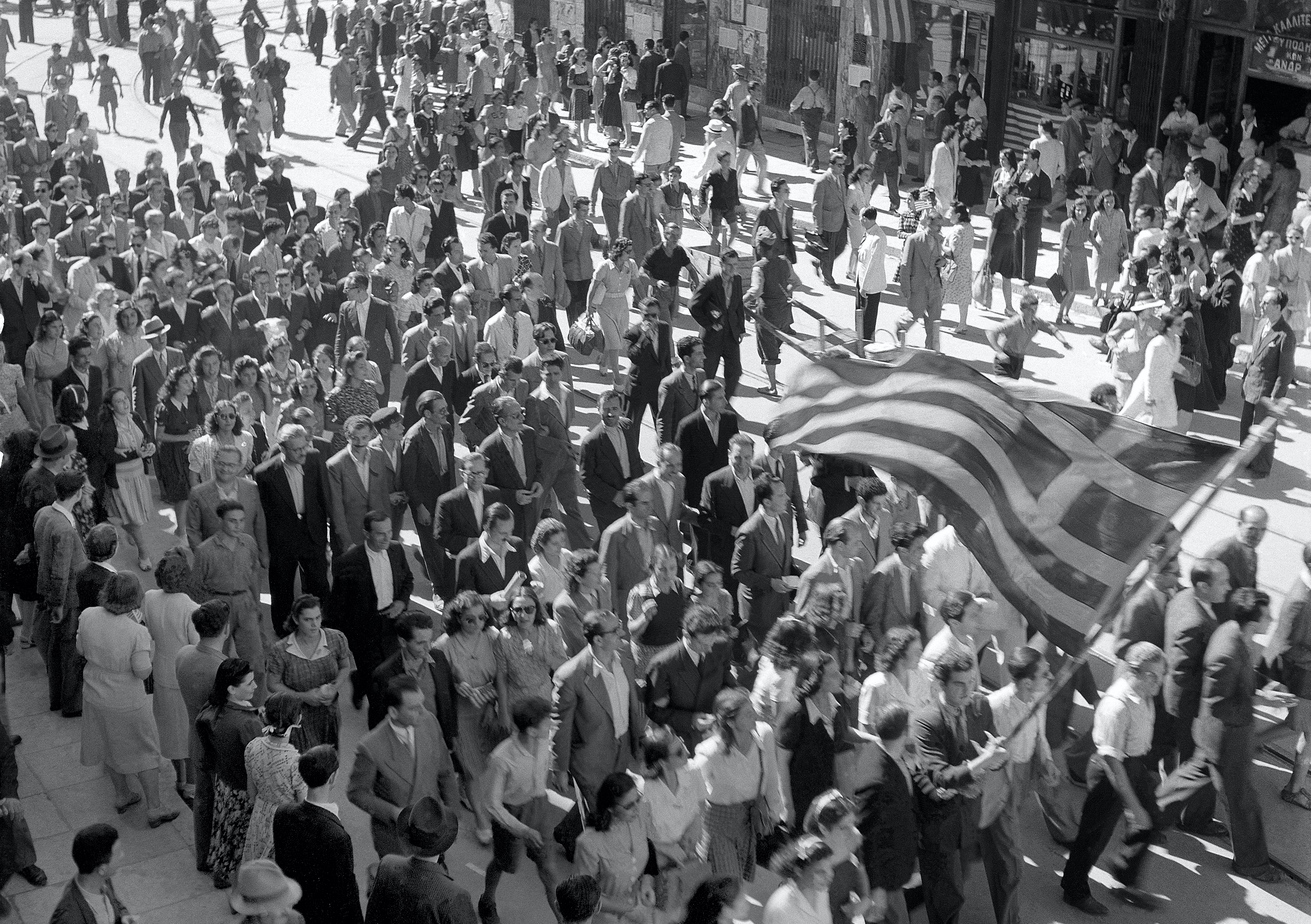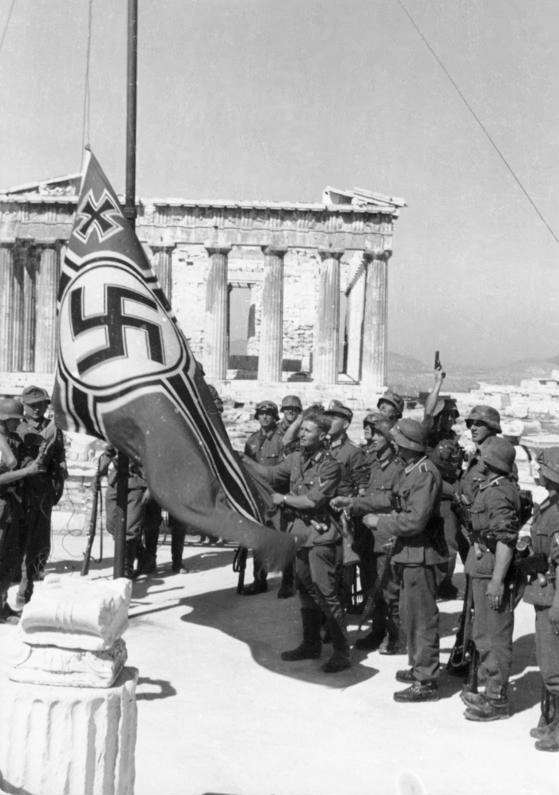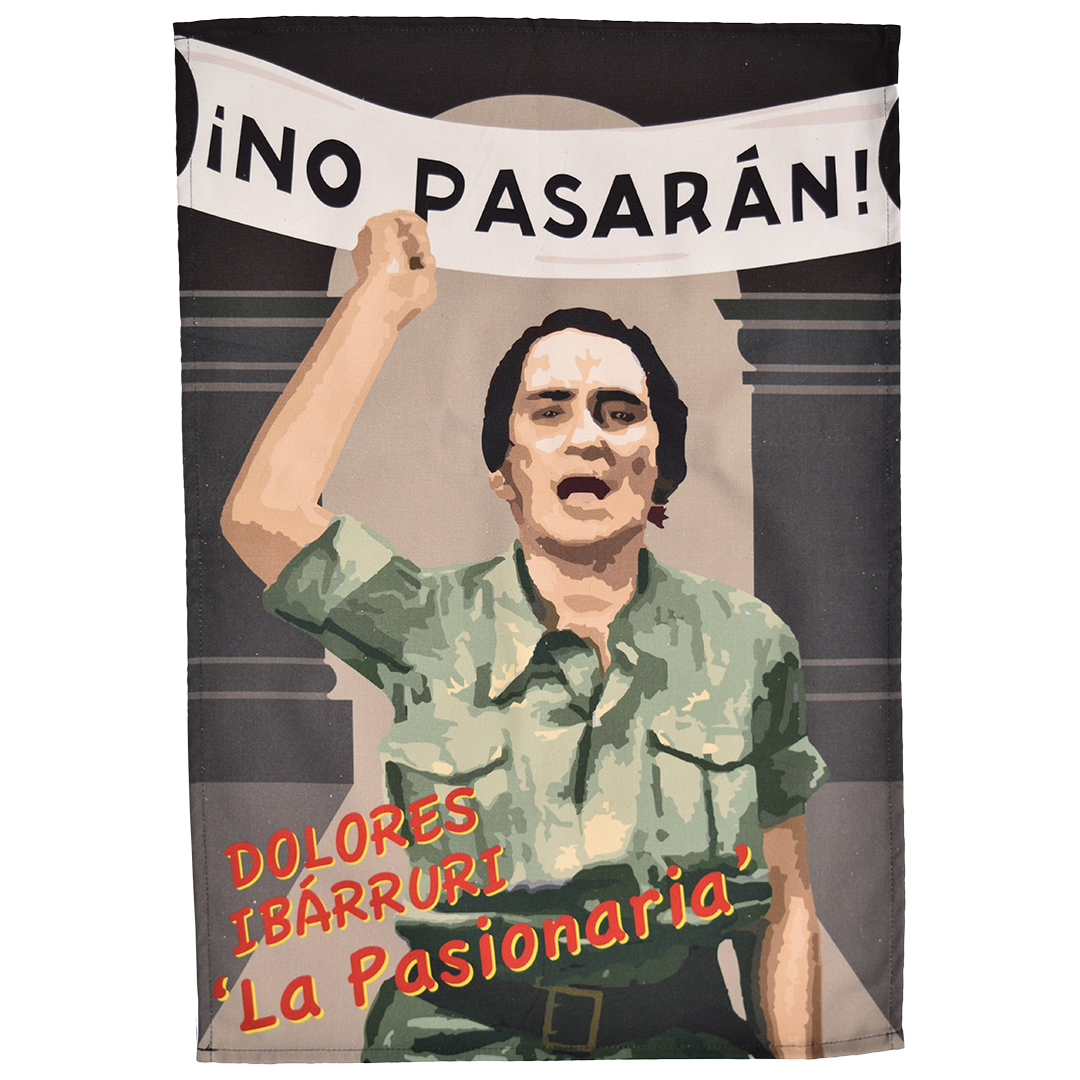A Free Greece: How the Greek Resistance Defeated Fascism
Posted by Pete on 12th Oct 2022

On this day in 1944, Greek resistance fighters liberated Athens from Nazi occupation
On 27 April 1941, Nazi troops began their occupation of the Greek capital of Athens.
In a staged photoshoot, they hoisted a swastika over the Acropolis, ancient seat of Athenian democracy.
A month later, on the night of 30 May, two Greek university students climbed up the side of the monument and tore it down.
Before Greece had even been fully occupied by Axis forces, the Greek resistance had begun.

Nazi soldiers raising the swastika over the Acropolis in Athens
The regular Greek army had fought hard to defend the country since it was first invaded in October 1940. Mussolini’s Fascist troops had been driven out, and he had to go running to Hitler for support.
The Germans proved too strong, and what was left of the Greek army had to be evacuated to fight on with the British in the Middle East.
In Greece, the war between armies was now over. The time of the partisans had come.
All over Europe, there was national and international
resistance to Axis occupation during WW2. But the Greek movement was one of the strongest.
It began with small acts, like those two teenagers tearing down the Nazi flag. But by late 1941, the Greek people were getting organised.
In Nazi Germany, the White Rose student movement was one of the major forces of resistance to Hitler's fascist regime
Click to view our White Rose tea towel
Like in France and Italy, it was the communists who formed the largest and most popular resistance group.
Closely linked to the Greek Communist Party (KKE), a National Liberation Group (EAM) was formed. It had 1.8
million members by 1944 – out of a Greek population of 7.5 million.
By early-1942, its armed wing – the Greek People’s Liberation Army (ELAS) – was up and running.
There was another big resistance group, the National Republican Greek League (EDES), which was more centre-left. And even some right-wing nationalists, who opposed the Axis occupation more because it was non-Greek than anything else, like ‘Organisation X.’
Arrayed against the Resistance were the combined occupation forces of Nazi Germany, Fascist Italy, and their Bulgarian allies, who’d been given a chunk of northern Greece by Hitler.
On top of that there was a puppet regime of Greek collaborators based in Athens.
The armed struggle scored a number of major victories during the years of occupation. In November 1942, a combined operation by ELAS and EDES
andartes (partisans) blew up the only bridge connecting north and south Greece.
But successful attacks on the occupation came at a price.
The Axis forces had no problem with massacring civilians – ‘reprisals’ – in response to even small partisan operations, or just protests.
After a popular uprising against the Bulgarian annexation in September 1941, Bulgarian forces murdered 3,000 people.
But fascist brutality only drove more Greeks to support the partisans.
Across Europe, the strongest anti-fascist movements have almost always been led by communists, including in Civil War Spain
Click to view our No Pasarán tea towel
There were labour strikes in the big cities. On the Aegean island of Euboea, the Jewish-Greek leftist Sara Fortis formed an all-female company of andartes to harass the occupiers.
By the summer of 1943, there were between twenty and thirty thousand Greek resistance fighters. They had
de facto liberated the countryside – a ‘Free Greece’ had been carved out covering 30,000 square kilometres.
Then, Mussolini was overthrown and Italy joined the Allies. The Italian forces in Greece disintegrated, and many of the soldiers joined the Greek Resistance.
The Nazis poured in more troops, who treated the population more brutally than ever. But the Greeks wouldn’t give in.
In summer 1944, the Soviet Red Army was moving into fascist Bulgaria. The Nazi forces in the Balkans were about to be cut off from Germany.
Under growing pressure from the partisans in Greece, with open battles in the working-class suburbs of Athens, the Nazis began to break.
On this day, 12 October, 1944, German troops fled Athens.
As in neighbouring Yugoslavia, Greece had been almost entirely liberated by its own people. British and other Allied forces arrived once the fighting was almost done.
Things quickly turned sour, as Churchill’s government decided to link up with the Greek Right, including the security forces of the collaborator government, to stop the Greek communists from taking power on the back of their wartime popularity.
But before all this bitterness, there had been triumph.
Three fascist regimes invaded Greece in 1940. Five years later, those regimes were all destroyed, while the Greek flag flew high over the Acropolis.


